Joint practice in Fukushima City on the 25th and 26th!
Joint practice in Fukushima City on the 25th and 26th!
There is exactly one month left until our performances in Tokyo and Koriyama next month.
This month's practice venue is the Fukushima City Public Hall, the first time for the Tohoku Youth Orchestra (TYO). Members are gathering one after another at this historic hall in Fukushima City, which can accommodate over 1,200 people.

All that remains is the practice session at the training camp before the performance. The conductor, Toshio Yanagisawa, seems to be in high spirits.

In particular, when it comes to Gustav Mahler's Symphony No. 1, which is said to be "something that is not normally performed (or can not be performed) by junior or youth orchestras," it seems like the number of Post-it notes with the sheet music is increasing with each performance.

We received many gifts today, as if to encourage the team's current situation and make it clear whether they will be able to perform well. First of all, the mothers of percussionist Toh Eijun and violinist Miura China brought us a variety of sweets, and then there was the "Yuzu Miso Yaki Onigiri" rice balls from Fukushima City, recommended by Otsuka Mari of the Fukushima office (just writing that makes me want to eat more rice bowls).

And, this two-day joint practice session was supported by JA Kyosai and JA Kyosai Ren Fukushima. As a result, the word "JA Kyosai" will be repeated and shown on screen many times in this report, and I'm sure some of you will be wondering, "Isn't this teacher receiving something personally?" But it's true that the Tohoku Youth Orchestra has received many benefits!

First, we gave out small servings of locally made bread and tea for 110 people to eat at lunchtime on the first day and as snacks between long practice sessions.
In the hall, the performers had been practicing Mahler's Symphony No. 1 since the morning.

Meanwhile, the junior high school students on their shift, trombonist Aoi Nishino and clarinetist Aoi Ono, appeared in the lobby as if they had sensed something, as their double Noois.

Just as I was thinking that junior high school students are at an age where they tend to get hungry, we received a new gift from JA Kyosai.

This is "Athlete's Foot Bread". You can imagine my shock when I found "Athlete's Foot Bread" among "Tea", "Lunch Box", "Toast" and other items on the gift list I received in advance. I had assumed it was some kind of misprint, but I was shocked to find that the maker of "Athlete's Foot Bread", Ryuichi Okazaki (75), the owner of "Okazaki Donuts", really delivered it by bicycle. What's more, JA Kyosai went out of their way to purchase this athlete's foot bread, not from their own company, but from the perspective of regional development. The athlete's foot bread comes in a variety of flavors, including peanut butter, strawberry jam, and chocolate, and the crunchy part, which seems to be meant to resemble an athlete's foot, has an exquisite texture, making it a nostalgic delicacy for those born in the Showa era. For those who want to learn more about athlete's foot bread, I recommend an article in the Sendai Kahoku Shimpo newspaper written by a member of the board of directors of the Tohoku Youth Orchestra.
That concludes the Fukushima City tourism information.
On this day, a 70-year-old man came to the practice venue, bringing with him a gift of strawberries that his parents grow and sell.

The business card of a 70-year-old man who came from Kesennuma in his daughter's car read,
It reads, "Miura Akio, Vice President of the NPO Let's Create a Forest by the Sea ."
If you read last month's report , you probably already know who he is. He is the grandfather of percussionist Mizuho Miura (3rd year junior high school student).

First, Mr. Akio Miura, a former high school teacher who served as the head of the Kesennuma local residents' association on 3/11, gave a speech to all the members for the last 30 minutes of the lunch break.
The long and powerful shaking was the strongest I have ever experienced, and the shoji screens came undone, the walls of the houses cracked before my eyes, and all the traffic lights in the town went out. I was shocked. The radio announced a 6m tsunami (actually it was over 20m in Kesennuma), and a couple in a light truck along the coast came running screaming, "A tsunami is coming!". I realized that it was really going to happen, and acted according to my regular disaster prevention training. I started living in evacuation shelter at Hashikami Junior High School, the designated evacuation shelter. Thanks to a large generator from a local construction company, we were able to get electricity right away. Gas rice cookers proved to be surprisingly useful. Although the rice provided by the local agricultural cooperative was quickly used up by the 2,000 evacuees, we were able to eat rice thanks to an old-fashioned rice polishing machine. Thanks to the refrigerated storage at the local fish processing plant, we were able to eat luxurious foods such as tuna, yellowtail, and scallops. I was relieved when the Self-Defense Forces provided us with meals 10 days later.
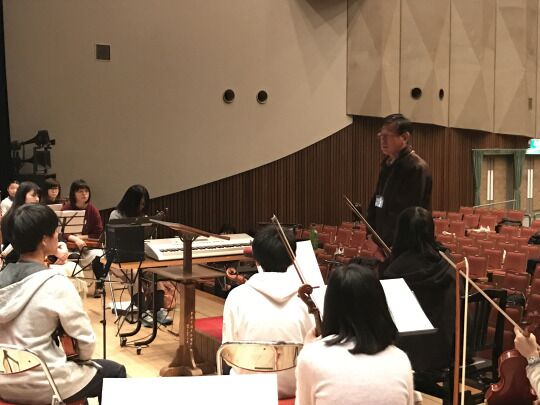
He strongly emphasized the importance of regular evacuation drills at elementary, junior high and high schools, and the importance of disaster prevention education. The three steps to disaster prevention and mitigation are said to be self-help, mutual help and public help, but this time he felt the power of mutual help within the local community. Even six years after the disaster, temporary housing remains, and in some areas, neighborhood associations have been forced to disband or merge. The damage varies, with one home being the only survivor of a family of eight, with only the daughter, a high school student. Finally, Miura's words struck a chord with us: "I have been given a mission to live my life: to rebuild and protect my local community."
Their quiet and strong will to give their limited lives resonates with the words of their granddaughter Mizuho the other day, "We have to do what we can to live." We took a commemorative photo of the two of them.

This time, Mizuho Miura's grandfather came to visit us not only to share his precious experience of 3/11. In fact, Akio Miura was also another teacher.
Now, let's continue. The grandfather of Kesennuma percussionist Mizuho Miura (3rd year junior high school student), former high school teacher Akio Miura, was also a folk song teacher. During the last joint practice session, while practicing "Three Tohoku Songs," an arrangement of folk songs from the three Tohoku prefectures that will be performed at this concert, it was discovered that the members did not know enough about the local folk songs to know what to do with the chants. So, they formed a "Team Chooser" that specializes in chanting, but then they wondered what to do about the instructor. Coach Sakamoto also advised them to "learn from local elders," and it reminded me of that. At the 2016 admission briefing held in Sendai last July, I asked, "We're going to try folk songs this time, are you parents familiar with them?" At that time, I remembered that the parent of a girl wearing yellow clothes who was sitting in the front row to my right told me, "This girl's grandfather teaches folk songs." So I looked at the photos to see who it was. It's good to take photos as a record.

Wow! It was none other than Mizuho Miura! So, in time for today's joint practice, she came to Fukushima City, driving three hours one way with her mother, to talk about her experience at 3/11 and to teach us how to sing folk songs. Here is a video of her teaching. First, we start with the Soma Bon-uta.
Please pay attention to Professor Miura Akio's massaging hands. His granddaughter Mizuho later said, "These massaging hands are important so that the tempo doesn't become too fast!" I learned the significance of the massaging hands for the first time in my 48 years of life. According to Professor Akio, Bon Odori was banned in Kesennuma, which was part of the Date Domain, by the feudal lord, so no local Bon Odori songs were created, and so they sang Fukushima's "Soma Bon Uta." This means that they secretly performed Bon Odori, hiding from the lord. There is an interesting book on Bon Odori from a folkloristic perspective. I won't link it here, but...
And about the call. It seems that the key is to pause at the beginning. This is the second scene of the teacher giving instructions.
And it comes from the "Southern Pun" that gave the name Team Chooser its name.
After the lesson, I spoke with Mr. Akio Miura, who told me, "I feel the power of music very strongly after the disaster. Some people feel energized by listening to music, while others get energy from singing. I hope the Tohoku Youth Orchestra will give a great performance that will lift everyone's spirits. I'm rooting for you."
This is encouraging to all the members.
Thank you to the Miura family who came all the way from afar to bring strawberries with them. It was my first time eating Kesennuma strawberries, and I had no idea they were so big and sweet. The members were delighted, and although they brought a half-dozen case (more than one pack per portion), they quickly finished about 100 of them in their stomachs.
Now, with only one month to go until the performance, I am trying to correct the foolishness I made last year of starting to write the script a week before the performance, and have once again asked Toh Hidezumi (who aspires to be a composer in the future) to compose the opening fanfare.
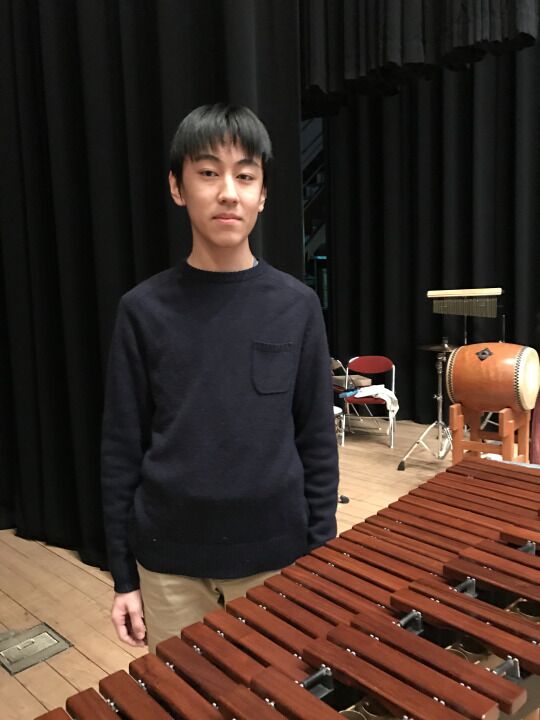
You've grown taller. I asked you to grow up and change the content of your performance from a trumpet duet to a trumpet trio this year.

He started working on it on his MacBook Air during the break. What a great junior high school student these days. In his hands is the main Mahler Symphony No. 1 pocket score. He's probably going to compose it as a homage to Mahler. If possible, let's have Director Sakamoto take a look at it.
We will be using a "special instrument" for Mahler's "Titans" to be performed in March. I pretended to know this, but I am a complete amateur and didn't even know the term "special instrument" until I got involved in this job. It is an instrument that is not used in standard orchestral arrangements. For this month's joint practice, the preliminary task was how to procure an "S clarinet". After this incident, I thought that "S" means "S" and "S size", which is "petite clarinette" in French, so I thought that it might be "Peque clarinet". Anyway, I learned that it is smaller than a normal clarinet, in E flat, and very expensive to buy.

These are people involved with special instruments. From the left, TYO's technical director, Norimitsu Iijima, is a trombonist, a music college graduate, and a director of Promax. He is in charge of all matters related to the performances of the members, as well as consulting with children who are aiming to become professionals. The man in the center is Yutaka Watanabe, who is the coordinator of the TYO Fukushima office. As a child, he also played the trombone in the FTV Junior Orchestra, and is now the owner and president of Brilliant, a wind instrument specialty store in Fukushima City. He secures practice spaces within Fukushima Prefecture, negotiates rental instruments, and manages the loading and unloading of instruments on practice days, and also maintains the members' instruments. And on the right is Momoka Kikuchi, a clarinetist who is a member of the orchestra and attends Fukushima High School.
Well, how did they solve the problem? I learned for the first time that Iijima-san's wife is a professional clarinetist and a member of the Siena Wind Orchestra, Iijima Izumi , and she even lent me her own instrument. Iijima-san said with a gloomy face, "My wife told me not to break it under any circumstances," so I couldn't just casually ask, "How much does it cost?" The name of the instrument, "Buffet Crampon Prestige Green Line," is also scary. "Prestige" is thought to be the French pronunciation of the English word Prestige. Every time I met Momoka Kikuchi at this practice, I would ask her, "Is your instrument okay? Is it broken?" as if it were a joke.

This is a picture of Kikuchi-san holding the high-end special instrument he borrowed. I was worried that it might snap, but I learned for the first time that it is actually vulnerable to temperature changes. Thank you very much to Iijima-san for kindly lending it to me.
On the first day, we practiced until 8pm, which was essentially a half-day. As expected, the members looked exhausted. This time, the accommodation issue for the more than 30 members who participated from Iwate Prefecture, Miyagi Prefecture, Hokkaido, Yamagata, and the Kanto region was resolved by JA Kyosai. Since it was the off-season, we were able to stay at the Surikamitei Ootori inn, which is run by JA Kyosai and is a 20-minute drive from the practice venue.

Moreover, they arranged for a bus to take us to the inn, and we arrived at a luxury inn that was beyond our means... I now understand why many of the Fukushima members had said "That's nice" to us during the day. As someone who shared my meals and sleep with geckos and other small insects in an economy youth hostel during the Miyakojima training camp two years ago, I was dizzy with the difference.

Despite our late check-in time of just after 9 p.m., we were treated to a special room with a long, horizontal piece of paper bearing the name of the Tohoku Youth Orchestra hanging up, and even had a meal in the room. Naomi Okada, the "big sister of TYO" who was giving the orientation for the stay, also spoke with enthusiasm.
At the beginning of this year's activities, I even came up with the slogan, "We are a small, poor band, and we're TYO, so don't think it will last forever." And so, like a broken robot, I kept saying, "This time is special. Let's be grateful to JA Kyosai."
Sunday mornings are early at TYO. I'm an old guy who doesn't wear makeup or do my hair, so I got up late at 6:30.

We had breakfast at a JA Kyosai inn. To take this photo, we asked three elementary and junior high school students who were eating together to move their seats as an adult consideration. Normally, the correct way to go to a hot spring is to eat breakfast and then take another bath, but as the leader of the morning walk group, this was not allowed. It all started with a LINE message I received the previous week from Akama Sora, a horn player living in Fukushima City.

Since we were staying overnight, we felt it was our duty to learn about the charms of Iizaka Onsen and spread the word about it to the world, so after practice the day before, we asked Akama to tell us about Iizaka Onsen.

So, the team that agreed to this project was a group of six elementary and junior high school students. We walked around Iizaka Onsen for about an hour like Bura Tamori, but it was too early in the morning to soak our feet in the foot bath, and the response to the Matsuo Basho quiz we asked along the way was not great, but we enjoyed the atmospheric townscape of Iizaka Onsen.
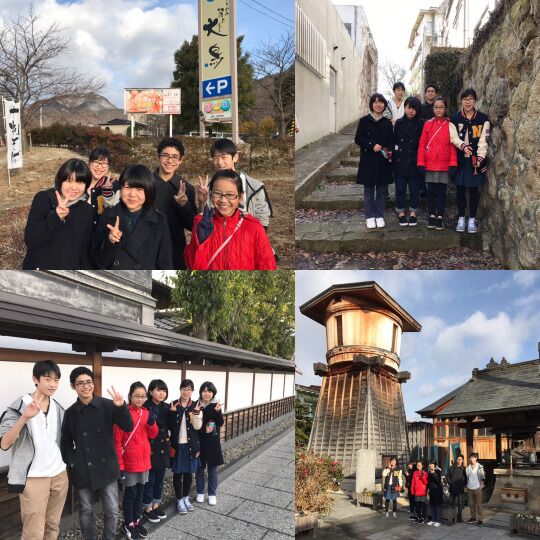
I heard that guests from outside the prefecture have not yet returned to stay after the earthquake. There are many photogenic places, such as the old hot spring where Basho also stopped on the Oku no Hosomichi, and the delicious round dumplings. Please consider Iizaka Onsen as a possible destination for your trip. In front of Iizaka Onsen Station, there is a magnificent bronze statue of Matsuo Basho, but opposite it is a suspicious object called the "White Post", and as a teacher in charge, I wondered how it looked from an aesthetic point of view.

Thank you to the cheeky elementary school student, Akama Kanayoshi, for suggesting a walk. By the way, Basho's traveling companion was named Sora.
That concludes the tourist information for Iizaka Onsen .
Well, one of the people on my morning walk, Fujita Salem, a first year junior high school student, and I had a naked chat while relaxing in the open-air bath late last night.
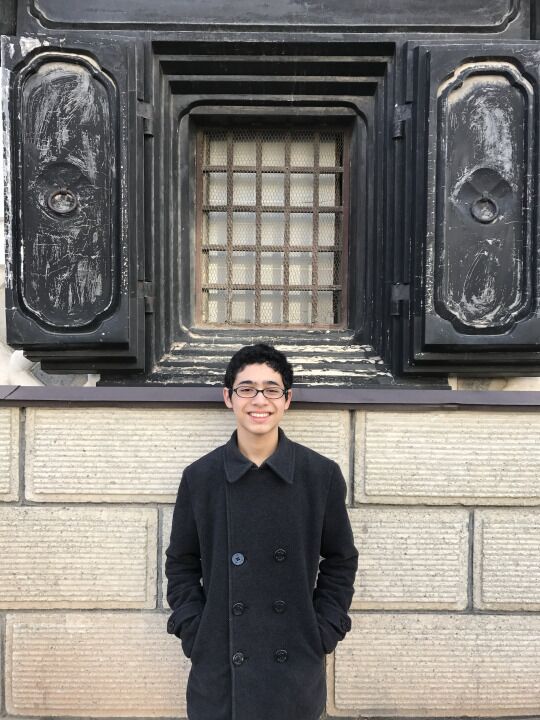
Here, we'll introduce a mini member of the band. We have a member from Morioka City, Iwate Prefecture, Fujita Salem, a trumpet player and first-year junior high school student. I had the following conversation with him while taking a bath the night before.
"Salem-kun, is your father a foreigner?"
"My father is Iraqi."
"Oh, it's Iraq!"
Actually, I was just having dinner at a ryokan and without even drinking, I said to him, "Most things that go well with rice go well with sake, don't they?" and the conductor, Mr. Yanagisawa, told me a cool American joke, "They say that rice goes well with salmon roe, but rice doesn't go well with Iraq." So I was surprised at the timely mention of "Iraq." Anyway,
"Oh, is it possible that your father is about the same age as me (48) or younger?"
"Oh, he's quite old, around 60."
"What are you doing?"
"My father is a university professor who is researching AI, and he's almost always away on business trips overseas."
"He's not a popular researcher right now. Does that mean you can't come and see the performance next month?"
"Well, it looks like he's staying in Germany."
"That's sad. By the way, Salem, you're really good at playing the trumpet. How many years have you been playing?"
"It's been four years already, I guess."
"Can you really become that good at playing the instrument in just four years?"
"I love playing the trumpet. So from the time I started, I just kept playing it because I loved it, and that's how I ended up like this."
"Have you not been told anything about teachers?"
"No, because if you learn from a teacher, you're limited by that person's range. But the other day, (trumpet section leader) Yuto Nakamura introduced me to a professional teacher for the first time. He said that the sound I play has a bright resonance, and that my tonguing (apparently cutting the sound into small pieces using the tongue) is fast."
"Wouldn't it be ideal if you could just keep playing because you love it and before you know it you'd be getting better? It's best to try and master that."
"I'll be busy with the competition next month as well, and after the Tohoku Youth Orchestra concert I'll go back to Morioka and then go straight to Tokyo."
"Are you going to do well in the national tournament?"
"I think I might be able to win a prize."
"That's amazing. What do you want to be when you grow up?"
"I want to be professional or a farmer."
"Haha, either a professional trumpeter or a farmer. Either sounds like fun."
Please keep an eye on Fujita Salem's future developments.
Now, the second day of practice will start with Mahler's Symphony No. 1.

And today, the lobby of Fukushima City Public Hall was lined with gifts of sweets, including some souvenirs from Osaka brought by Nakamura, the university trumpet player who joined us that morning.

Mr. Takaaki Yashiro, section chief of the Community Activities Support Office of JA Zenkyoren Fukushima, came to the lobby to encourage the members.

Following yesterday, tea from JA Kyosai Ren Fukushima!

Plus, we have a variety of breads to snack on!!

They then brought in lunch boxes for 110 people. Yashiro-san, who had come alone, assisted Fukushima Minpo's Deputy Director Takanori Yoshida, and the two of them even helped set out the lunch boxes in the lobby before the lunch break.
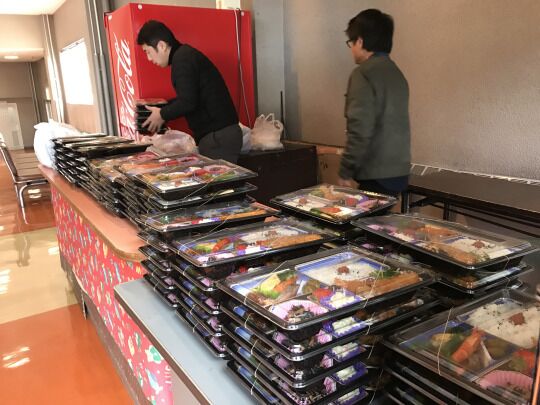
Usually, in large companies, it is common to have young people help out at such sites, but on this day, I was touched and convinced by the sight of two managers alone carrying the cardboard boxes that had been loaded into a car, carefully arranging the lunch boxes for the members, and neatly folding each of the large plastic bags (22 bags in total) that had been packed into groups of five.
I felt that these two people had gone beyond the role of "office workers who work on holidays" and had come here as "passionate individuals who support TYO."
Both of them flatly refused, but I thought it would be best for them to give a few words of encouragement to the members of the group, so I persuaded them to stay and spoke to them at the end of the morning practice.

"Thank you very much," said Yashiro to the members of the group.
"I'm from the generation that grew up listening to YMO's 'Technopolis' on mono radio when I was in junior high school. I'm envious of everyone who will be performing with Ryuichi Sakamoto, who I've admired since I was a child. I'll be fully supporting you as Ryuichi Sakamoto will be supporting the reconstruction efforts through the Tohoku Youth Orchestra as its director. Please do your best for the concert."

Next, Yoshida appeared, holding the morning paper with an article about yesterday's practice .
"This time, we will be hosting a performance in Koriyama as part of the Fukushima Minpo newspaper's 125th anniversary project. Please practice hard until the performance. We are rooting for you."
As you said, this first performance in Koriyama was made possible by the organizers taking the risk of commercialization. I have heard that there are still tickets unsold as of today. The concert will feature guest appearances by Director Ryuichi Sakamoto, Sayuri Yoshinaga and Unaigumi, and the tickets will be priced at 3,000 yen for S seats and 2,000 yen for A seats, a great value that would be unthinkable in Tokyo or Osaka. As March 26th is a Sunday, we are confident that it will be well worth it even if you come from afar. We hope you will cheer us on from the packed auditorium.

Thanks to you, the lobby was filled with cheerful smiles as we ate during lunch break. Thank you again.
One member of the Tohoku Youth Orchestra immediately posted a message of gratitude on Instagram .

Are you familiar with using hashtags?
During the break in the afternoon practice on the second day, volunteer members also practiced a performance to be performed at a community center in a reconstruction housing complex in Ishinomaki on Saturday, March 11th, which is Miyagi Memorial Day.

On the day, about 20 members of the group will voluntarily participate, and I have heard that they plan to take part in disaster prevention training and food distribution at the memorial ceremony, which will be held mainly by the local community. Mr. Akio Miura of Kesennuma also mentioned the importance of regular training.
The following day, on Sunday, March 12th, we will be performing as string and brass ensembles at Sendai Mitsukoshi. This is because we provided Ryuichi Sakamoto's composition "ETUDE," which we performed at last year's concert, as a support song for the "Acorn Badge Charity for East Japan Reconstruction Support," which began at the Mitsukoshi Isetan Group on March 1st. The song is currently being played in stores nationwide, and we will be performing at the Sendai Mitsukoshi charity event. You can listen to the support song "ETUDE" on this announcement page .

This is a sample of the acorn badge that was shown to the members. There are 28 different badges, one for each, on sale at each store for 300 yen. Please come to your nearest Isetan Mitsukoshi Group store to see the real thing and listen to the in-store broadcast of "ETUDE"!
Two fulfilling days of practice have come to an end. However, even after the performance practice is over, there is still an important task that must be done every time. The members of the orchestra work together to carry out the large instruments they borrowed and load them onto the truck without damaging them.

The beefy college student in the truck is Yuta Tomizawa from Iwaki City. He always carries a tuba with him, so he is always the leader of the heavy lifting. As with last year, the timpani and other instruments have been loaned to us free of charge by Fukushima Prefectural Tachibana High School. Thank you very much.
Then, as usual, we all saw each other off as the bus headed from Fukushima Station to Sendai Station.

This large blue bus is also provided by the bus company where the mother of one of our members in Sendai works. Thank you very much again.
What I realized again during this two-day joint practice was that the Tohoku Youth Orchestra exists thanks to the support of many different people, companies, and organizations. We receive "money" from individuals, such as donations and sponsorship money from companies, and "goods" such as instruments, practice space, food, drink, accommodation, and transportation for the members to continue their musical activities, provided free of charge or at a lower price than usual. This kind of support in kind is called "Value In Kind" in English, or VIK for short. Money and goods are the same in terms of the value that supports our activities.
Peter Drucker, the father of modern management and the leading authority who invented the concept of "management," has written a book called "Managing Nonprofit Organizations."

This opening sentence stands out: "Nonprofit organizations exist to make a difference to people and society."
Is the Tohoku Youth Orchestra becoming such an organization? It seems like it has become so, but it also seems like there is still a long way to go. However, we have received support from many people in the form of "money" and "materials". And I noticed another very important form of support. We often talk about the three management resources of people, materials, and money, but I thought that there is a way to look at the resource of "people" in more detail.
It is "(people's) time." Human life is limited, and everyone will eventually die someday, sooner or later. In the face of this overwhelming fact, what do we spend our limited time on? There are many people who use their precious time for the Tohoku Youth Orchestra. This is the third form of support, "donating time."
The Miura family of Kesennuma, through their near-death experience on 3/11, were strongly aware of the mission of their remaining lives. This is also reflected in the precious gift of time given to them by Ryuichi Sakamoto, the director and representative of the orchestra, who was diagnosed with and overcame oropharyngeal cancer three years ago, who wrote out the scores of the orchestra's orchestral arrangements for the orchestra members. The Tohoku Youth Orchestra exists thanks to the donation of limited time from all those involved.
In order to make sure we could start practicing as soon as the break time was over, we asked Fukushima university student Mikiko Hattori to be the time management leader. This should allow us to wait for Yanagisawa Toshio on time with everyone tuned up (ideal).
It's something we tend to forget in the course of our daily lives.
Whether you believe in reincarnation or not,
That we only have one life.
This report ended up getting long as I updated it in my spare time. I want to become a "comprehensive existentialist."
Once again, we would like to ask for your continued support for the Tohoku Youth Orchestra.
The accompanying teacher and reporter, Hirokazu Tanaka